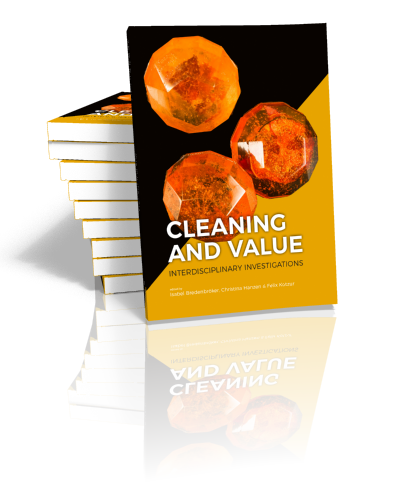Abstract:
This volume combines scholarly contributions on the relation between values and cleaning processes in different places, cultures and times. The core disciplines are archaeology and anthropology with interdisciplinary additions from sinology, classic philology, philosophy, sociology and fine arts. The individual contributions are the proceedings of a workshop organised by members of the DFG graduate school 1576 “Value and Equivalence” at Frankfurt University in June 2017. Among the contributors are researchers from Yale University, University of Cambridge, Brandeis University and Frankfurt University.
The editors do not intend to establish a theoretical concept of cleaning as a paradigm in academic discourse. Instead, our aim is to test the term’s potential for moral and practice-related implications from an interdisciplinary perspective. We understand the term cleaning as referring to a conglomerate of practices. These are rooted in social norms, morals and organisational structures. Due to the inclusive multiplicity of the term it functions as a soft concept. Aspects of materiality, social organisation, creation and conservation of value, devaluation as well as destruction come into play.
Contents
Preface
Hans Peter Hahn
Introduction
We have never been clean. Towards an interdisciplinary discourse about cleaning and value
Isabel Bredenbröker, Christina Hanzen, Felix Kotzur
Disciplinary reflections
Archaeology and Cleaning: Some reflections on the archaeological process
Ulrich Veit
How is dirt possible? On the philosophy of dirt, cleanliness and refuse
Olli Lagerspetz
Contexts and Places
The Last Bath: Cleaning Practices and the Production of ‘Good Death’ in an Ewe Town
Isabel Bredenbröker
The cultural aspect of cleaning in archaeology – a case study from the late Neolithic site of Fıstıklı Höyük
Georg Cyrus
CARPE Dirt, Disease, and Detritus: Roman Sanitation and its Value System
Ann Olga Koloski-Ostrow
Bodies, Objects and Personal Hygiene
A matter of representation – personal hygiene in Eastern Zhou-dynasty China (771-256 BCE)
Catrin Kost
Impurity and purification: multi-layered conceptions of cleaning in Central Asian burial rituals
Jeanine Dagyeli
Your Clothes Should Be Clean! Your Head Should Be Washed!
Body Cleaning and Social Inclusion in the Epic of Gilgamesh
Ainsley Hawthorn
Social practices and politics
Shaking out the Tablecloth – Uzbek Hospitality and the Construction of Boundaries of Belonging
Sebile Yapici
The Cleansing of a Political System: Obliterations, Burials and ‘Reuse’ of Palaces and Seats of Power in Central Italy (Seventh–Fifth centuries BCE)
Robinson Krämer
Cleaning up the past
Mareike Späth
Artistic contributions
Chrischa Oswald – Mother Tongue
Kerstin Gottschalk – Mehl, Salz und Wasser zu einem Teig verarbeitet und auf die Spiegeloberfläche aufgetragen, Größe variabel
Andreas Koch – Duschvorhang (Shower curtain)
Robert Schittko und Nikolaus Kockel – Performance
Wagehe Raufi – In between contemporary stones
Anna Langgartner – Contemporary Art and the Gaze of an Archaeologist: A interpretative attempt of decay and lost evidence
Mia Bencun – Bruise 13








